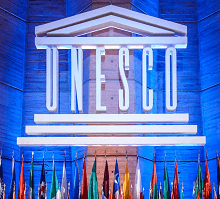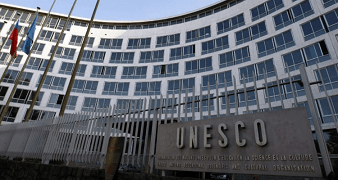UNESCO - United Nations Educational, Scientific and Cultural Organization
United Nations Educational, Scientific and Cultural Organization (UNESCO) is responsible for the communication and peaceful interactions between different countries and cultures. Different countries have different cultures and heritage; the World is full of diversity. Maintaining peace and communication in such diversity is very difficult. Hence there was the necessity of an organisation to regulate human rights, preserve culture and maintain peace in the diversity, which led to the establishment of UNESCO. What is UNESCO?UNESCO is the United Nations Educational, Scientific and Cultural Organization. It instils peace and promotes international coordination in Education, Sciences, and Culture. It is responsible for conducting programmes for sustainable development and other goals to maintain peace. These programmes are designed to contribute to the Sustainable Development Goals of Agenda 2030, adopted by the UN General Assembly in 2015. The UNESCO came into existence on 16 November 1945, consisting of 195 members and eight associate members. The governance of the organisation is the responsibility of the General Conference and the Executive Board. The implementation of the decisions of these two bodies is done by the Secretariat, who is headed by the Director-General. UNESCO is headquartered in Paris and has around 50 offices across the World. The prime objective of UNESCO is to promote peace, eradicate poverty, sustainable development, and intercultural dialogue. These objectives are achieved by implementing programmes related to education, communication, culture, information, and the sciences. UNESCO connects the civilisations, cultures and people through communication and mutual respect for values of each other. The dialogue helps the organisation achieve sustainable development goals at a global level. Human rights, mutual respect, and eradication of poverty help in achieving the global goal of peace. All these are part of the activities and mission of UNESCO. There are various objectives of UNESCO that help it move closer to its goal of sustainable development. These objectives are listed below;
Apart from the objectives mentioned above the UNESCO focuses on gender equality. It is the global priority of UNESCO. 
Mission of UNESCO
Governing Bodies of UNESCOUNESCO is governed by the General Conference and the Executive Board. These two bodies are responsible for the governance and implementation of policies and orders if any. The meeting of the General Conference is conducted every two years. It comprises representatives that belong to the government, non-government, UNESCO member state, and non-member states organisations. The body indulges in the creation of the policies, budgeting, and business operations of the organisation. Likewise, the Executive Board also meet twice a year and consists of the members elected by the General Conference; there are fifty-eight such members. The Executive Board monitors whether the activities adhere to the Constitution of the United States. Its other function is to oversee the operations of the organisation. History and Establishment of UNESCOInternational Committee on Intellectual Cooperation (ICIC) is the forerunner of UNESCO. It was established under the League of Nations in Geneva; this was not until 1922. Many renowned scholars were part of the ICIC; the list consists of Albert Einstein, Marie Curie, and so on. The founding director of the ICIC was Inazo Nitobe. During that period, he also served as the Under Secretaries-General of the League. Afterwards, the establishment of the International Institute of Intellectual Cooperation (IIIC) took place in Paris. The prime function of this organisation was to implement the policies designed by the ICIC. It used the financial aid provided by the French Government for the smooth working of the plans of ICIC. IIIC was responsible for a variety of activities in different fields. These were later called off due to WW II. The activities were conducted in fields such as the arts, information, library, universities, media, and intellectual properties. After WW II ended, a United Nations Conference was conducted. The motto of this Conference was to establish an educational and cultural organisation. The Conference had representatives from over 44 countries. The France and United Kingdom initiated, and other delegates arrived at a conclusion to establish an organisation that had the goal of peace. Hence UNESCO was established, and its constitution was written and signed. It was not until November 1945. The constitution of UNESCO was effective from November 1946. Functions of UNESCO1. Education:UNESCO believes in providing everyone with access to quality education. Sustainable development is part of its mission, and eradicating poverty is its other motto. It mandates to cover all aspects of education and is the only organisation in the United States to do so. Through its sustainable development goal, UNESCO is entrusted to lead the Global Education 2030 Agenda. UNESCO is also responsible for strengthening the education system and tackle global challenges through education. It caters to major challenges with gender equality and all underlying principle. UNESCO involves education from pre-schooling to higher education and even beyond. The major themes that are included in the UNESCO motto are sustainable development, skill development, health, human rights and technical training. 2. Culture:Culture transforms society, and it is a vital part of our lives. The diverse nature of cultures, such as the monuments, museums, art forms, and traditional practices, enriches the way people live. Heritage provides economic stability and identity to people and communities. Heritage and creativity together help in building societies that are enriched with knowledge and follow their particular culture. UNESCO believes that for a development to be sustainable, it must have a cultural component. There must be open dialogue and mutual respect between different cultures; this will only lead to sustainable development. However, the culture was still missing from the development equation. UNESCO is the organisation that operates considering cultural convections. Human rights and the shred values act as the basis for holistic cultural governance. There are international treaties that are designed to protect and preserve the culture and natural heritage of the society. It also protects and safeguards the policies made by them. 3. Science and Sustainability:The knowledge and understanding of sciences aids in overcoming the challenges that we face today. These challenges can be economic, social, and environmental. The knowledge also helps us in the sustainable development of society. It is difficult for one country to achieve sustainable goals alone. Hence international corporation is necessary. It also ensures that peace is maintained. 4. Social and Human Sciences:Today, maintaining harmony among people is a difficult task. UNESCO helps people understand the culture and working system of each other. It helps in bringing people together and building peaceful relations among different cultures. Additionally, it supports people who wish to utilise their knowledge for the well being of the societies that aim for sustainability. However, lasting peace depends on the daily practices that are adopted in local settings. The individuals and communities find creative solutions and conduct programmes together to maintain sustainable conditions and live together with peace and harmony. During a global crisis, when there is a threat to humanity in conditions such as inequality, violence, etc., UNESCO builds the ritual of learning to live together. It promotes human rights and ensures that these are taken care of by the people. Non- discrimination and togetherness have become important among the global communities, societies, and individuals. Individuals learn to live with different cultures and gain experience through learning from others. They learn to manage conflicts and face challenges with mutual understanding and effective solutions that benefit everyone. Moreover, they learn to appreciate diversity and become interculturally competent. Development ProgrammesUNESCO helps its states and members understand the challenges of diverse societies, which is also helpful in addressing the challenges in a better manner. The various programmes of UNESCO aim to achieve the same. These programmes include Management of Social Transformations (MOST), Cultural Peace and Non-Violence Programme, and Youth Programme. The initiatives are taken for global citizenship, peace-building, and achieving sustainable goals. Additionally, these programmes promote intercultural dialogues. Furthermore, UNESCO promotes activities of development such as sports. It also maintains the integrity of cultures as it combats doping and recognises that sport disregards both social classes and geographical borders. UNESCO builds connections among ethicists, scientists, policy-makers, judges, journalists, and civil society to assist the Member States in enacting policies on ethical issues in science and technology. Some Initiatives of the UNESCO1. Futures of Education:This initiative aims at building a system to promote knowledge for the effectiveness of humanity. It relies on a process of discussion which involves a different set of groups that include educators, government, youth, civil societies, businesses, and other stakeholders. Furthermore, it will be guided by thought leaders from varying fields and regions of the World. These people will constitute an International Commission to guide the programme. The Commission aims to publish a report of a forward-looking vision of education; this will be done by November 2021. 2. Freedom of Speech:The mandate of UNESCO mentioned to have a free flow of ideas through words and images. It is the responsibility of UNESCO to establish a free and independent system of media in print, broadcast, and online. Freedom of speech is stressed upon, and it protects human rights, drives peace, and eradicates poverty. The UNESCO promotes the freedom of speech in the press. It also supports the journalists and protects them. UNESCO helps the diverse media community and brings issues related to health, and ensures awareness through the media. UNESCO provides journalism education through its initiatives in media and information literacy. UNESCO also provides grants from the International Programme for the Development of Communication (IPDC) to the media projects that have missions aligning with that of UNESCO. All these initiatives and projects are part of the support that UNESCO provides for freedom of speech to protect human rights.
Next TopicAPI - Application Programming Interface
|
 For Videos Join Our Youtube Channel: Join Now
For Videos Join Our Youtube Channel: Join Now
Feedback
- Send your Feedback to [email protected]
Help Others, Please Share










